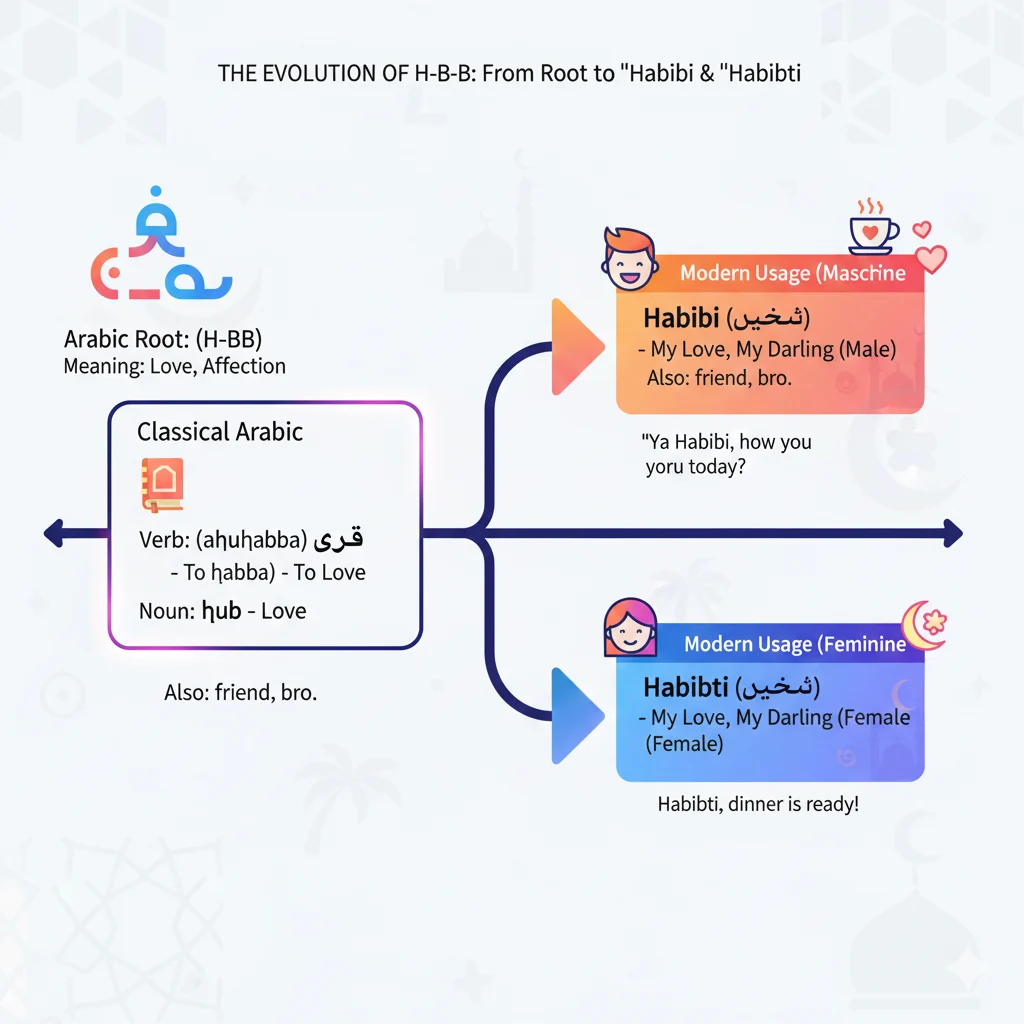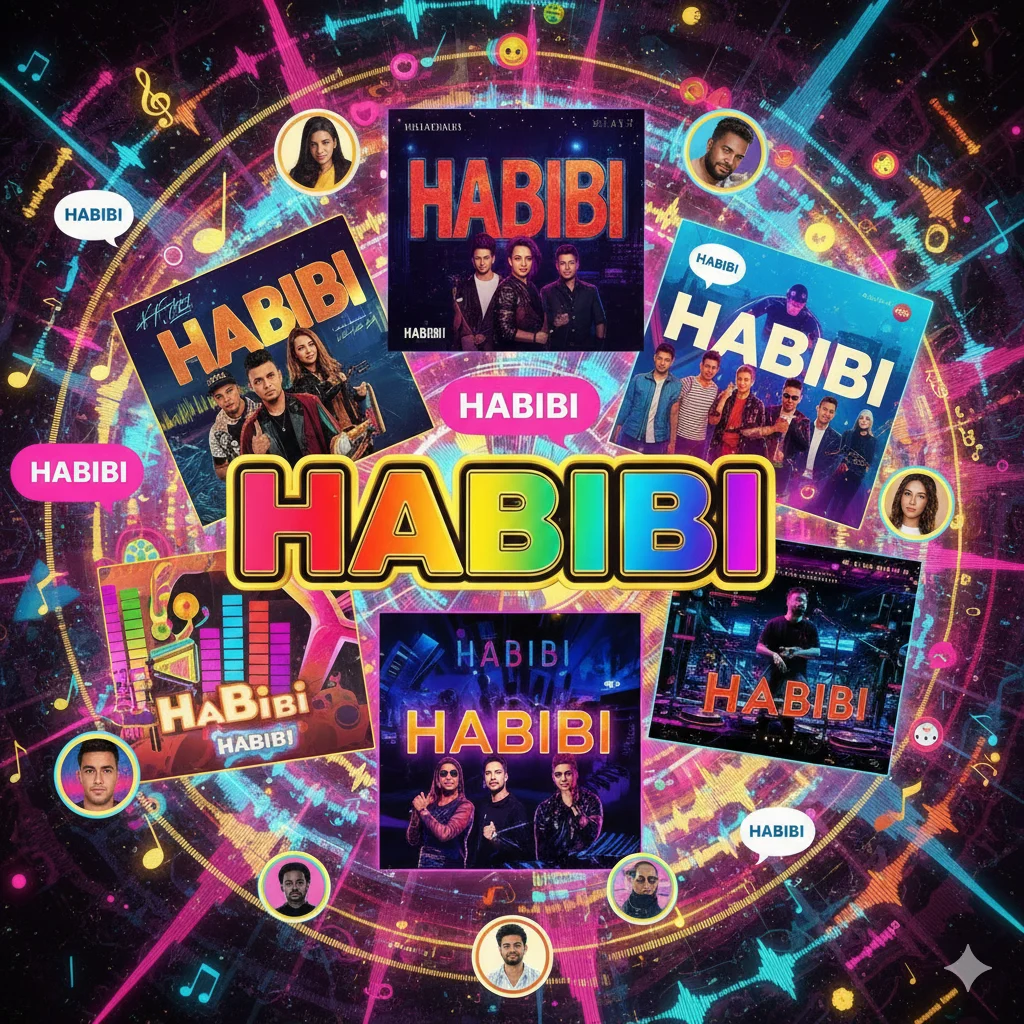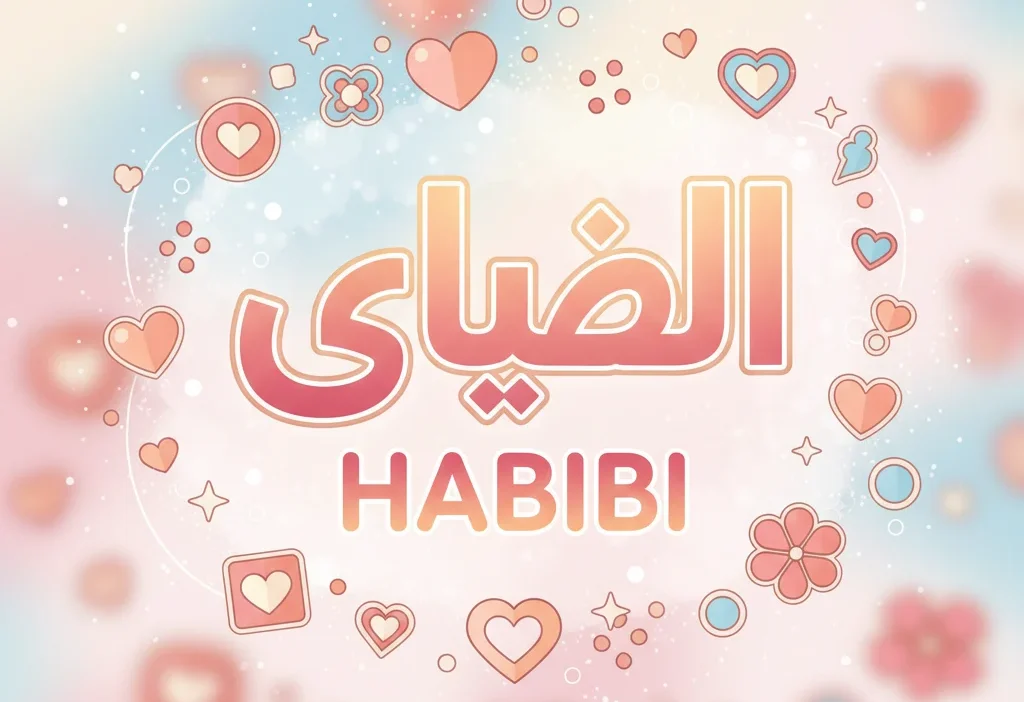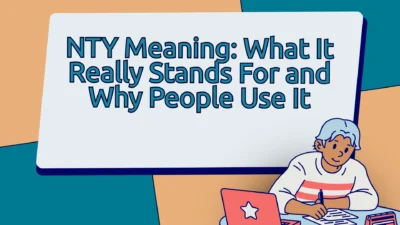“Habibi” is an Arabic term meaning ‘my beloved’ or ‘my dear,’ used to address someone affectionately. It can refer to a close friend, family member, romantic partner, or anyone you care about.
Though it has roots in Arabic culture, today it’s widely recognized worldwide due to music, movies, social media, and popular culture.
The Meaning of Habibi in Simple Words
Habibi (حبيبي) literally translates to:
- “My love”
- “My darling”
- “My dear”
It is commonly used in informal, affectionate contexts. The female form is Habibti (حبيبتي), meaning “my beloved” for women.
Key Uses:
| Term | Meaning | Usage Example |
|---|---|---|
| Habibi | My beloved / my dear (male/female casual) | “Habibi, come here!” |
| Habibti | My beloved (female) | “Habibti, how are you?” |
| Habib | Beloved / love (gender-neutral, often formal) | “He is a habib to his family.” |

Origins of the Word Habibi
Habibi originates from the Arabic root ḥ-b-b (ح-ب-ب), which revolves around love and affection.
- Habib (حبيب) = beloved / dear
- Habibi (حبيبي) = my beloved / my dear (male)
- Habibti (حبيبتي) = my beloved / my dear (female)
It has been used in Arabic culture for centuries as a term of endearment among friends, family, and lovers.
Habibi in Different Cultures
Though Arabic in origin, the term has traveled across cultures:
- Middle East – Common everyday affection between family, friends, and lovers.
- North Africa – Frequently used in Moroccan, Egyptian, and Tunisian dialects.
- Western pop culture – Adopted through music, films, and social media.
- Diaspora communities – Arab immigrants often use Habibi to address non-Arab friends playfully.

Habibi in Music
Many international songs feature “Habibi,” increasing global recognition:
- “Habibi” by Ricky Rich – Used to express love and longing.
- “Habibi (I Need Your Love)” by Shaggy – A romantic pop song popular worldwide.
- Arabic pop music – Almost every love song in Arabic incorporates Habibi for affection.
This made it both a romantic and friendly term globally.
Habibi in Social Media and Texting
On apps like Instagram, Snapchat, TikTok, and WhatsApp:
- Habibi = “bro,” “mate,” or “friend” in casual contexts
- Can be playful: “Habibi, check this out!”
- Expresses warmth and closeness
Texting examples:
- “Habibi, are you coming to the party?”
- “Thanks, habibi, you’re the best!”
It’s widely used among Arabs and non-Arabs who enjoy its affectionate tone.
Habibi vs Habibti – Gender Differences
| Term | Gender | Meaning | Example |
|---|---|---|---|
| Habibi | Male | My beloved / my dear | “Habibi, come here!” |
| Habibti | Female | My beloved / my dear | “Habibti, how are you?” |
| Habib | Neutral/any | Beloved / loved one | “He is my habib.” |
Notes:
- Male speakers use Habibi for men and women; female speakers often use Habibi for men and Habibti for women.
- Context determines whether it’s romantic, familial, or friendly.

Romantic Meaning of Habibi
When used romantically:
- Habibi = boyfriend, husband, lover
- Habibti = girlfriend, wife, lover
- Often used in endearing conversation: “Good morning, habibi! I miss you.”
It conveys deep affection, intimacy, and warmth.
Friendly or Casual Meaning of Habibi
Among friends or family, Habibi is less romantic:
- Can mean “buddy,” “pal,” or “mate”
- Shows closeness without romantic intent
- Often used in Arabic-speaking communities to greet each other warmly
Example:
“Habibi! Long time no see!”
Habibi in Popular Culture
Movies and TV
- Hollywood & Arabic films often feature characters calling each other Habibi, showing affection.
- Used in romantic dramas and comedy as a familiar term.
Memes and Internet Humor
- Social media memes use Habibi to express drama, love, or sarcasm.
- Example: “Habibi when someone eats my food 😭”
Songs
- Widely used in songs to show longing, love, or friendship.
Habibi as a Compliment
Habibi can also show admiration or respect:
- Used to greet someone with warmth
- Acknowledges closeness or loyalty
- Adds charm to casual conversation
Example:
“You did an amazing job, habibi!”
How to Pronounce Habibi
Proper pronunciation is key:
- Habibi: ha-BEE-bee (male)
- Habibti: ha-BEET-tee (female)
Stress is on the middle syllable “BEE” or “BEET.”
Common Expressions with Habibi
- “Ya habibi” – “Oh my dear!” (emotional or playful)
- “Habibi wallah” – “My beloved, I swear” (used for sincerity or emotion)
- “Habibi inta/enti” – “You are my dear” (male/female form)
These expressions are widely used in conversation, songs, and social media.
Habibi in Table Form (Context Use)
| Context | Meaning | Example |
|---|---|---|
| Romantic | Lover, significant other | “Habibi, I love you.” |
| Friendship | Close friend, buddy | “Habibi, come here!” |
| Family | Endearing term for siblings/relatives | “Habibi, how was school?” |
| Pop culture | Song lyric or meme | “Habibi, you know the vibe” |
Habibi in Emoji & Internet Usage
Habibi often accompanies emojis in texting for added affection:
- ❤️ (love)
- 😘 (kiss)
- 🥰 (affection)
- 🤗 (hug)
- 😍 (admiration)
Example:
“Good morning habibi 😘❤️”
It softens messages and adds warmth.
How Habibi Is Used in Different Countries
| Country/Region | Usage |
|---|---|
| Middle East | Everyday affectionate term, romantic or friendly |
| North Africa | Used in greetings and casual conversations |
| Western countries | Borrowed in pop culture, music, and social media |
| Diaspora communities | Used playfully among Arabs and non-Arabs |
When to Use Habibi
- When greeting someone affectionately
- Addressing family or friends warmly
- Complimenting a partner
- Adding charm to text or speech
- Expressing love, care, or closeness
When Not to Use Habibi
- Professional or formal situations (work, school, official meetings)
- Addressing strangers in formal contexts
- When tone could be misinterpreted
Habibi in Literature
- Poets and writers often use Habibi to evoke love, longing, or closeness.
- It adds emotional depth to dialogue or lyrics.
Example from literature:
“My habibi, your presence lights my heart like the sun.”
Habibi and Gender Sensitivity
- Male speakers: Habibi for both males/females
- Female speakers: Habibi for males, Habibti for females
- Tone and relationship determine how it’s interpreted
It’s important to use it respectfully depending on culture and gender.
5 FAQs About Habibi
What does habibi mean in English?
It means “my beloved,” “my dear,” or “my darling.”
Is habibi only for romantic use?
No. It can be used for friends, family, or lovers depending on context.
What is the female version of habibi?
Habibti is used for women.
Can non-Arabic speakers use habibi?
Yes, it’s widely recognized worldwide in music, memes, and pop culture, but pronunciation matters.
Is habibi informal or formal?
It is informal and affectionate; not suitable for professional contexts.
Conclusion
Habibi is more than just a word—it’s a cultural expression of affection, love, and warmth. Whether you use it for a romantic partner, close friend, or family member, it conveys care and closeness. Its widespread presence in music, movies, social media, and global slang makes it universally recognized as a term of endearment.
Understanding the meaning of habibi and its correct usage can help you express affection, connect with Arabic culture, and even add charm to modern conversations.





